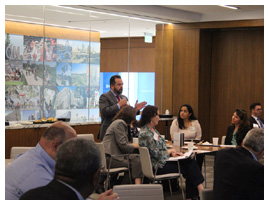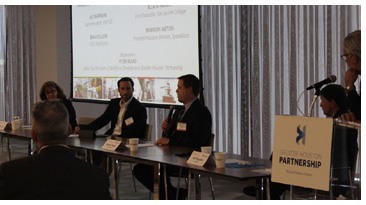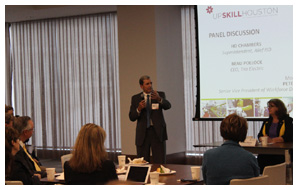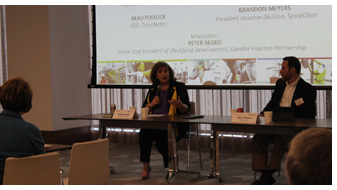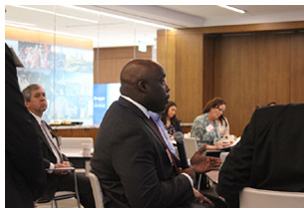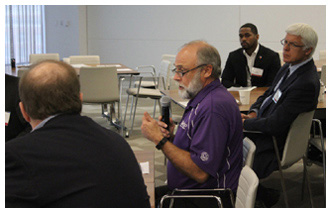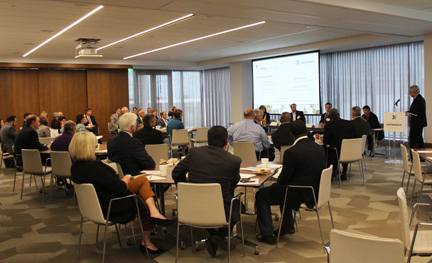 The Greater Houston Partnership (GHP) hosted a town hall on Friday for leaders in the education and construction industries to learn about and discuss ways in which they can partner to bring workforce opportunities to students and build the construction craft workforce of the future. The UpSkill Houston Town Hall: Build Your Facilities and Build Your Community was held in the GHP’s beautiful new space in Partnership Tower, where regional superintendents, college and university chancellors, and construction contractor executives and owners enjoyed a light lunch while listening to the program before offering their own comments and questions to the panel at the end.
The Greater Houston Partnership (GHP) hosted a town hall on Friday for leaders in the education and construction industries to learn about and discuss ways in which they can partner to bring workforce opportunities to students and build the construction craft workforce of the future. The UpSkill Houston Town Hall: Build Your Facilities and Build Your Community was held in the GHP’s beautiful new space in Partnership Tower, where regional superintendents, college and university chancellors, and construction contractor executives and owners enjoyed a light lunch while listening to the program before offering their own comments and questions to the panel at the end.
Bob Harvey, President and CEO of the Greater Houston Partnership, kicked off the program by welcoming the group. He said:
“We’ve been working to identify pathways for individuals to get the certifications, skills, education, and credentials that they need to move into the ‘middle skill’ jobs in Houston, which as we all know pay quite well. This is a key factor affecting our competitiveness as a regional economy, and it is a key factor in creating a cohesive community where everyone has a sense of opportunity in this region. If we can create these pathways, people will have such a sense – and frankly if we can’t, people are going to feel quite disenfranchised.”
Bob went on to say that one purpose of the day was to introduce the group to the Construction Career Collaborative (C3) and the principles that C3 has established, all of which align perfectly with the GHP’s UpSkill program. He mentioned that the beautiful space where everyone was currently meeting was built using these principles in order to recognize the importance of developing a quality construction craft workforce in Houston. He said that in order to do this, “Owners have to play a role. This is not just an issue for the contractors.”
Bob then went on to address the educators in the room: “What better sector than the education sector to embrace the idea that owners can work with the construction sector and the construction crafts to not simply complete projects on time and on budget, but to also use every project to help build this trained construction craft workforce here in Houston. It takes a conscious effort by the owners to do that.… I am excited by the potential, and hopefully you see the potential as well.” He said that the GHP thinks the education sector has a specific role or even duty to think about how to use its own construction work to accomplish a broader mission than just to erect the needed structures.
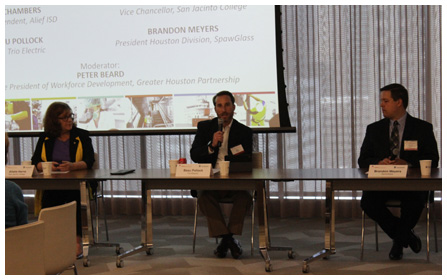 The program continued with some introductory comments by Stephen Harris. Stephen serves as the Director of the Strategic Design and Initiatives in the Office of Facilities Planning and Construction of The University of Texas System where his work there over the past 15 years included Project Management. He is an architect by training and worked for several architectural firms before joining the University of Texas (UT) System. He has a B.A. in architecture from UT and a master’s degree in Public Affairs from the Lyndon B. Johnson School of Public Affairs.
The program continued with some introductory comments by Stephen Harris. Stephen serves as the Director of the Strategic Design and Initiatives in the Office of Facilities Planning and Construction of The University of Texas System where his work there over the past 15 years included Project Management. He is an architect by training and worked for several architectural firms before joining the University of Texas (UT) System. He has a B.A. in architecture from UT and a master’s degree in Public Affairs from the Lyndon B. Johnson School of Public Affairs.
The Office of Facilities Planning and Construction (OFPC) manages 30 to 60 projects at a time, representing $2-3 Billion in contracts at a time to build the facilities required by the UT System. Stephen explained that they do their work in collaboration with the office of Risk Management. He outlined the recent history of the work the office has covered, including the establishment of the Builders Risk Program following the “inconsistent response from the market on builders risk insurance” in Galveston following Hurricane Ike.
When a UT Systems Task Force for Facilities Planning in the 21st Century looked at best practices from the construction industry, they came up with the realization that “We need to come out of this with UT being the ‘Contractors Owner of Choice,’” which prompted Stephen to suggest C3 as a solution. Stephen explained what happened:
“What does that mean? Well, I think it means that we want people to come see our jobs on the street, come want to work for us, gain some experience, be treated well and come back. So, I took the opportunity to introduce C3 as a topic to be included in this initiative. And the answer that I got was ‘that’s the contractor’s problem – move on.’”
Stephen did not move on. I will tell you more of his story in an upcoming blog detailing more of his remarks.
Hopeton Hay, Director of The University of Texas System HUB Group and the UT Federal Small Business Program, was also prepared to speak, but due to time constraints, Peter Beard, Senior Vice President Regional Workforce Development at the Greater Houston Partnership and panel moderator for the day, moved ahead in the program.
Before Peter introduced the panel, he talked a little about the Construction Career Collaborative (C3). He said that C3 is a collection whose leadership includes owners, contractors, and specialty crafts subcontractors. He described C3: “They use an accreditation approach whether it is to be an accredited employer or something more project-specific. The three basic tenets of what C3 focuses in on are: one – to level the playing field by paying on a W-2 instead of a 1099 and paying by the hour; two – focusing on safety and safety training; and three – having ongoing craft training and plans for craft training. That’s an area where C3 is continuing to develop – focusing on ensuring that craft training is occurring.”
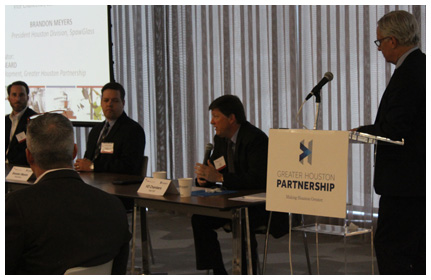 Peter then asked everyone in the room to share our names, company names, and our roles there so that the panel would know “who’s in the room.” A wide variety of organizations was represented by the attendees. There were representatives from service and workforce centers, general contractors, specialty subcontractors, universities and community colleges, C3 board members, trade associations, and K-12 independent school districts.
Peter then asked everyone in the room to share our names, company names, and our roles there so that the panel would know “who’s in the room.” A wide variety of organizations was represented by the attendees. There were representatives from service and workforce centers, general contractors, specialty subcontractors, universities and community colleges, C3 board members, trade associations, and K-12 independent school districts.
Peter then introduced the four discussion panel members. They were HD Chambers, Superintendent of Alief ISD; Brandon Meyers, President Houston Division of SpawGlass; Beau Pollock, CEO of Trio Electric; and Allatia Harris, Vice Chancellor of Strategic Initiatives at San Jacinto College. Peter said, “Each of these folks is going to have some insight into what Steve presented. I have some questions I will ask them, but I want them to give them a chance to share their insights in what they think is exciting about what they have been working on.”
The ensuing discussion requires more coverage, but for now, I will share something that panelist Allatia Harris said towards the end of the discussion:
“Steve said something in the very beginning that I think sums up a lot of it. He talked about people who say ‘Well that’s not my decision or my responsibility; that’s the contractor.’ What [Stephen] described was owning the project and accepting the responsibility as an owner. As an owner, you have a lot of power and authority to determine how work is done, how people are treated, and what values are enacted on that workplace. If children’s parents go to work in this industry, and they work for the ‘bad apples’ as opposed to working for the kinds of businesses we are talking about here, then we have a problem recruiting young people into it. When parents work in something where they can hold their heads up, then it is a different reality for their children. Accepting the power that comes with ownership – and having educators think of that the way those of us who work with the petrochemical industry know – they are the owners and they determine what’s going to happen on their projects. We [owners of projects other than petrochemical] have that same authority if we accept it and use it. Steve, you said that from the very beginning, and I wanted to lift that up.”
The luncheon ended with a palpable buzz of excitement for the innovative new partnerships between construction businesses and education organizations for craft training and for the future of workforce development in the industry.